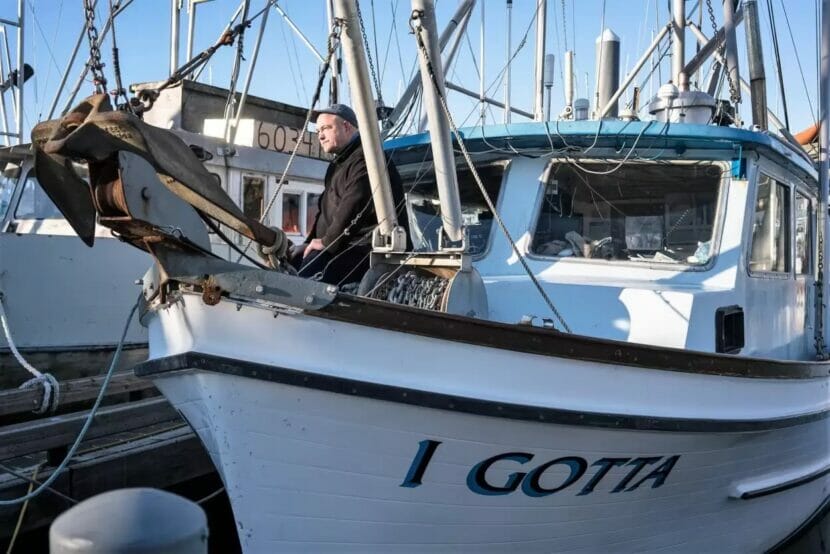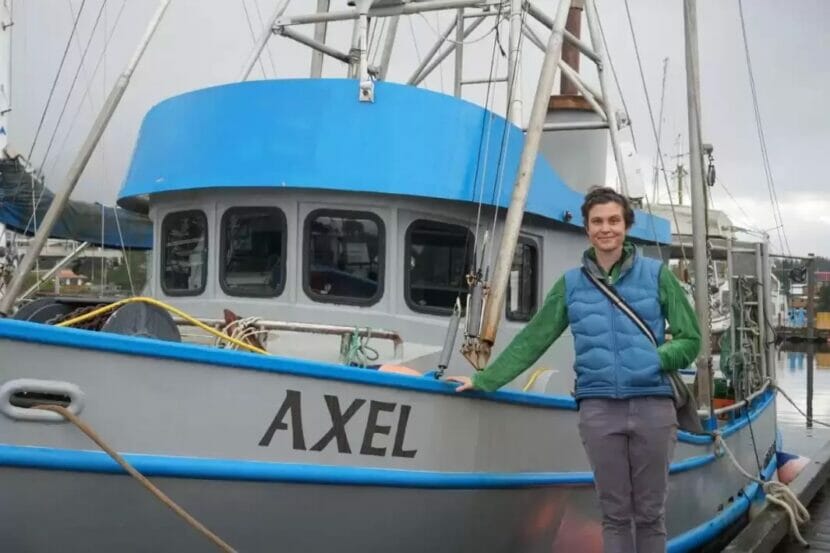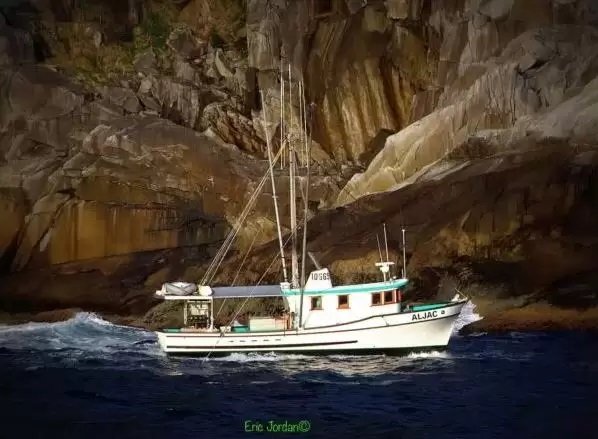
Barring a stay, or a successful appeal, or other eleventh-hour legal action, there will be no troll fishery for king salmon in Southeast Alaska either this summer or winter.
The fisheries have been canceled by order of the U.S. District Court of Western Washington on largely procedural grounds. According to the ruling they stem from a violation of the Endangered Species Act, and the failure of the National Marine Fisheries Service to fully address the impact of Alaska’s king salmon trollers on an endangered population of orcas in Puget Sound called Southern Resident killer whales.
No other salmon species or commercial gear group or sport fishery – anywhere on the entire Pacific Northwest coast – is affected by the order, just commercial trolling for king salmon in Southeast Alaska.
Heading out every July 1 in search of Alaska’s most valuable salmon – also called chinook – has been an annual ritual across the region since before statehood.
Shortly after the court order came down, KCAW’s Robert Woolsey met with trollers Eric Jordan, Jacquie Foss, and Jim Moore to discuss what no king salmon season will mean for them, personally and professionally. This is their conversation, in three parts.
Part 1: The practical implications of a summer without Chinook
Foss: The cost of a boat exists whether or not the king salmon fishery happens or not. You have to pull it out of the water, you have to maintain your zincs. There’s work that you have to have just to make sure your boat stays fishing. And so that’s still happening for us. How we’re gonna pay for it is less certain.
Moore: I’m confident that we’re going to have a season. I’m confident that the king salmon season is going to open July 1st. I feel that we have so much support. Our congressional delegation is working behind the scenes. The State of Alaska is throwing its full weight into the fight. The Alaska Trollers Association are [intervenors and] co-defendants with the National Marine Fisheries Service and the State of Alaska. And everybody’s working pretty hard to make sure that we’re out on the water this summer. I don’t know exactly how it’s going to happen. It’s a legal court case. And so different parties hold their cards close. But I’m confident we’re gonna go ahead. So I’m planning on going ahead.
Foss: I always appreciate sitting next to Jim and his optimism, because I don’t always go there. The decision last week (May 3, 2023) was a gut punch. And fishing is how I can afford to raise my family in Sitka. So it’s really affected me in sort of a more existential way: Who are we if we’re not fishermen? Who are we if we’re not catching king salmon on our boat?
Jordan: It’s already affected boat values. I just had a survey on my boat, on what I would say as a very optimistic estimate. Even though I’ve made improvements since the last survey, [my boat] has lost about 20% of its value. Right away. People can’t sell their boats. I spent a whole week before this latest [court] decision preparing to sell gear at the Fisherman’s Flea Market because I’m getting ready to retire and I have thousands of dollars of really good surplus gear that’s basically worthless right now, except for the chum troll and coho gear. But thousands of dollars of king salmon plugs and spoons are just basically worthless.
Emotionally, I have to call my crew and tell them the situation. Some of them just love fishing king salmon. We do really well chum trolling, and Jim [Moore] and I helped pioneer that, but I’ve had crew members cry when I’ve told them that we’re gonna go chum fishing instead of king salmon fishing.
Foss: You know, it’s more of a spiritual problem than a financial one. Because fishermen are scrappy people. We will always figure out how to make expenses somehow. It’s just…we’d be broken in some way doing that, if that makes sense?
You know, not catching king salmon has a huge, huge impact to our financial bottom line: 40% of our income. And so there’s the argument, “Well, you can find the other 40%.” That 40% allows us to make the other 60%. So it’s not like you can just make up that amount of income somewhere else on the water or in some other fishery. It’s really holistic.
Jordan: There’s a miraculous, wondrous thing about catching king salmon and pursuing them all over the coast, from Dixon Entrance – like Jim’s fished – from Forrester Island to Cape Suckling. And the chum troll fishing is not going to save us. It’s gonna help.
Moore: Having fished a long time, I’ve seen a lot of changes in the fishery. And I have to say that when I bought my first boat, people said, “There’s no future in it. It’s over. It’s had its heyday and it’s going down.” But I’ve seen this cycle of boom and bust, optimism and pessimism several times. And that’s one reason why, you know, if we’re looking at grief over this court case, I’m in the first stage: denial.
Part 2: The importance of king salmon to the identity of trollers

Jim Moore bought his troller in 1970. This summer will mark his fifty-third year as a professional salmon fisherman. Eric Jordan wasn’t born on a troller, but when he was still an infant, his parents rigged a bunk for him in the cabin of their boat, a 32-foot double-ender named “Salty,” and he could watch them fish for king salmon through a porthole. Having fished every year since, Jordan is about to turn 73 years old.
Jacquie Foss doesn’t yet have that kind of seniority, but she might one day. She and her husband fish as a family, with their 8- and 10-year old children on board.
These three Sitka-based trollers are typical of the Southeast Alaska fleet: They have exceptional longevity in a difficult profession, and a multi-generational investment in their businesses.
Foss: Every year the fish – it’s exactly the same and nothing alike. You’re in the water, you’re dragging hooks. But are they going to hit the herring this year? Or is it going to be this spoon? Or is it gonna be the spoon that you have buried in there that worked 10 years ago that might work now? It’s about the puzzle. And it’s about the fact that our entire year really starts July 1. That’s our New Year: our whole life is centered around that July 1 opener.
Moore: I’m just so blessed to have found a livelihood doing something so interesting and creative. Every single day is different. And it presents a whole new set of problems to solve. “You know, I think I’ll try that green thing that I used 15 years ago,” and then have them hit it – that’s a tremendous feeling: success.
Foss: And it’s just this anticipation and joy, and just the puzzle of king salmon, because they could be where they’ve always been, they could not be there, you could have a 10-fish day, you could have a 300-fish day. That’s 300-fish day is a feat. One hundred is a lot – just your arms are tired, but you’re not tired. It’s hard to come up with the words.
Jordan: What I said in my deposition on this Wild Fish Conservancy suit: because we handle each fish individually, our connection with them is strong. And we care about them, we respect them. And that comes from my friend Amy Gulick’s book captures, The Salmon Way in Alaska from the Indigenous origins thousands of years ago, right to the present. We honored these creatures, and in trolling, especially those that offer themselves to us, for us to sustain our bodies with the finest food on Earth. But we also sustain them by fighting to protect their spawning grounds, their passageways, their lives. And that’s what breaks our heart because we are fighting for them. And now we’re being excluded from their harvest.
Foss: It’s hard to not develop a connection, when you are intimately involved with ending a creature’s life. And it’s not something that anyone takes lightly. And you’re right… you’re right there. And it’s not easy, but it’s good. Because you know that you’re taking care of the creature quickly, as painlessly as you can. If you’re going to take life and you’re going to extract a resource and you’re going to eat meat, it’s really important to do that as respectfully to the creature that you’re taking it from as possible.
Jordan: Let me tell you, there’s a lot of grief in the troll fleet. A lot of grief, and families and people need help. So not only do we have to think about making financial arrangements so people can make or delay their payments with the state or CFAB [Alaska Commercial Fishing and Agriculture Bank] or whoever else. Banks. We also need to think about mental health counseling for people who are devastated and don’t know how they’re going to feed their families – literally.
Moore: You know, I’m proud of the product that we produce. This whole battle, this court battle with Wild Fish Conservancy trying to shut down a food-producing industry, without considering: there’s 300 million people right now – not killer whales – 300 million people are starving to death. There are 2 billion people that are “food insecure,” as they say. And I just feel sick about all of the energy being spent, all the resources being spent, just to try to be able to continue to produce food for people.
Part 3: Trollers and conservation

In a state where fish landings are most often measured in the millions of pounds and millions of fish, the Southeast Alaska troll catch of king salmon is a small fraction of the overall harvest. This coming season – if there is a season – Southeast trollers will take just 149,000 chinook salmon.
Those fish are mixed into a salmon pie that is shared by Alaska, Washington, Oregon, and Canada – a pie that is sliced by an international agreement called the Pacific Salmon Treaty. Over the past couple of decades, Southeast trollers have accepted smaller slices of the pie to preserve the health of salmon stocks covered by the treaty, and they’ve even accepted deep cuts in the harvest of kings which originate in Alaska’s rivers – and aren’t subject to the treaty – to make sure that those stocks thrive.
In short, Southeast trollers have nothing to gain and everything to lose if king salmon don’t survive. They are conservationists, whether or not they use the label.
Foss: I want to make it very clear that trolling is (a) 100-year old fishery, and if it was not sustainable for a long period of time, it would be evident. And I have not ever seen another resource extraction group begrudgingly-but-willingly not go fishing to ensure the longevity of the species. Is that the right thing to do? Absolutely. When it became apparent that we were going to take a hit on king salmon in the last (Pacific Salmon) Treaty cycle for political and conservation purposes, we could weather it because the emphasis is making sure there’s fish in the future.
Jordan: Trollers have been the allies of conservationists for decades. Salmon fishermen all over this state fight things like Pebble Mine, things like the borax mine in Misty Fjords. Trollers have worked to protect the salmon habitat throughout the region from mines in British Columbia. I’ve written op-ed editorials on those mines, working with Salmon State and others. We are the greatest allies of people who want to conserve king salmon and other salmon species. And for us to be vilified and attacked is just plain wrong.
Foss: It’s really easy to look at a problem and decide that someone else should pay for it. It’s really, really hard to look internally to see what you’re doing and how you’re contributing to that problem. And I really feel like that’s what’s happening here [with the Wild Fish Conservancy lawsuit].
Moore: This fishery is the poster child for sustainability. There’s never been – that I know of – any run of salmon that’s been wiped out by a hook-and-line fishery. When I first started fishing, there was the criticism that it’s too inefficient. Well, we’re not hearing that much anymore (laughs). But anyway, we’re hearing these narratives that are just outright lies. Like “the increase in greedy corporate fishing.” My kids grew up on the back deck of the boat, you know, this is “greedy corporate fishing,” you know. They learned that they could work hard and produce something tangible. And your success depends on being able to understand and connect with something you can’t see directly. From that standpoint, it’s like science. I can’t decide whether it’s more like art or like science. It’s both.
Jordan: And one of the things that happens, as both Jim and Jacquie have mentioned, is the connection you develop with these places, the ocean, the ecology, the fish that you’re pursuing. It’s really a love affair.
Foss: You just love it. You love everything about it.
Moore: You know, I love the killer whale. I’m connected with the killer whale. This is not about saving the killer whale, this battle. It’s about destroying this industry. That’s the stated agenda: the Wild Fish Conservancy, they want to eliminate ocean fishing, mixed-stock fishing, and they want to eliminate the hatchery program. That’s a small minority viewpoint – a very small minority viewpoint. They had an opportunity to move their agenda, and they took it. But it’s an immoral decision. It makes me sick.